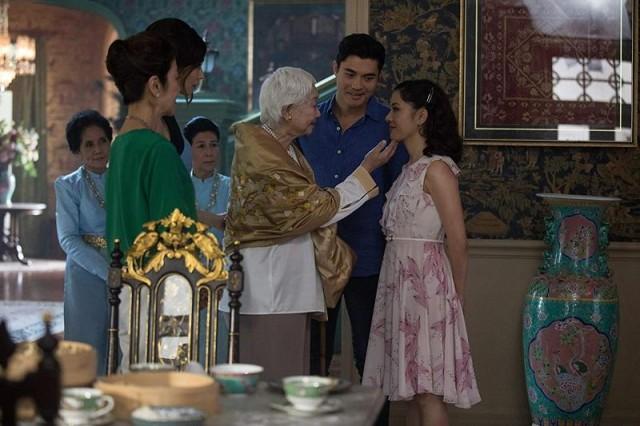'Crazy Rich Asians' breaks drought of All-Asian cast Hollywood film
Los Angeles — After a long drought of Hollywood films featuring an all Asian cast, the world welcomes director Jon M. Chu’s romantic comedy, “Crazy Rich Asians” to break that spell.
The last time Hollywood had an all-Asian cast was when “The Joy Luck Club” was released 25 years ago in 1993. Before “The Joy Luck Club” there was 1961's“Flower Drum Song.”
Incidentally, Lisa Lu, who is our colleague and friend, was in “The Joy Luck Club” and is also featured in “Crazy Rich Asians” as Shang Su Yi.
Based on the bestselling novel of Kevin Kwan, the movie also features Constance Wu (Rachel Chu), Michelle Yeoh (Eleanor Sung-Young), Henry Golding (Nick Young), Ken Jeong (Goh Wye Mun), Awkwafina (Goh Peik Lin), Gemma Chan (Astrid Leong-Teo), Harry Shum, Jr. (Charlie Wu), and Filipino actors Nico Santos (Oliver T’sien) and Kris Aquino (Princess Intan).
Filmed on location in Malaysia (Kuala Lumpur and Penang) and Singapore, the film is about a young Asian-American woman, Rachel Chu, who travels to meet her boyfriend’s (Henry Golding), family only to find out that her boyfriend belongs to one of the richest families of Singapore.
We recently talked to Constance Wu, Michelle Yeoh, Henry Golding and director Jon M. Chu at a Beverly Hills hotel and below are excerpts of our conversations with them:
Constance Wu
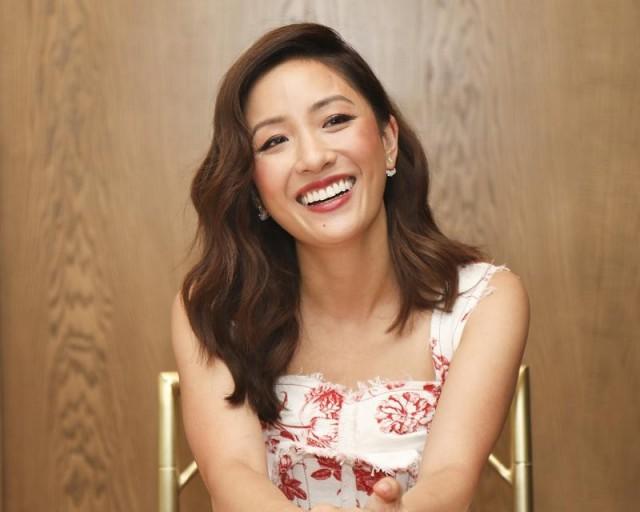
On discovering her culture while making the movie:
Yes, I think you recognize that when you grow up in a place where your face is not part of the dominant culture, that shapes your identity and not in a good or bad way, just in a different way. It shapes you in a way that I'm so proud that we get to explore in this movie and also just class differences is something I learned about in this movie because it just was a crazy rich world. My grandparents were farmers so that was definitely new. But every project I do, I take something from it and try to learn from it.
On being chosen by Time magazine as one of the 100 most influential people:
I felt very surprised. I did not expect that at all. I felt surprised and flattered.
On how she would use that influence:
If you have a voice, you might as well use it for good and so I would like to help amplify the voices of people who don't feel heard. I get a lot of trolls online who say really mean stuff about me and I actually think they're good people. I just think that when you don't feel heard as a person, it can make you mean and so I want to use any influence that I have to make sure marginalized communities, not just Asian-Americans but different that they feel heard and they feel like their stories are important and worthy.
On when she decided to become an actress:
I have a lot of people help me do this, help me put on make-up and stuff. I just did theater from an early age, so I've been an actress for a long time. When I was a kid, I loved to sing and dance. I've been a professional actress since I graduated from drama school and it's the opposite because when I was in my 20's in New York, I didn't get parts. I actually never thought it was because of my race. I always thought it was because I wasn't pretty enough because I'd be in these rooms with all these tall, willowy models who are just like impossibly cool and beautiful. It made me feel really insecure but it made me feel like I'm going to work on the parts of my career that I can work on and that meant a lot to me which is the acting work.
Michelle Yeoh
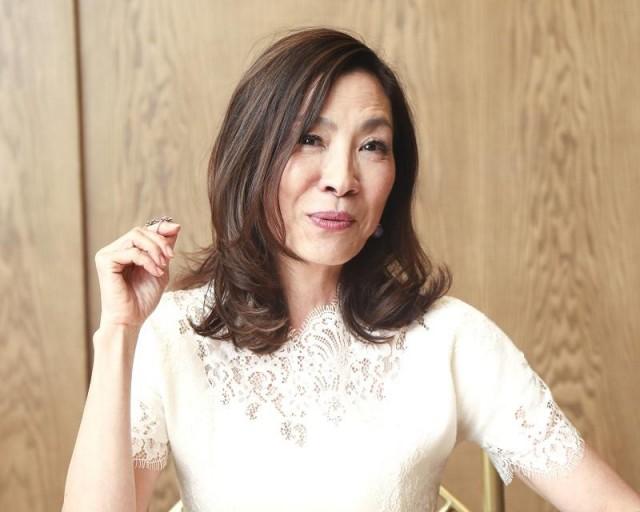
On how rich Asians now pass their wealth from other wealthy people around the world:
I think today not so much. The nouveau riche — it's sometimes insecurity on your part where you feel that if the other person knows that you are rich, they will treat you better but it's not always the case so some people wear their wealth outwardly so that you know I have the big watch, I have the diamonds, I have this so you should treat me accordingly because I am well-off.
But I think now, people are much more understated because, unfortunately, there's also a lot of crime in the place. You have to be more careful of flaunting what you have so people are much more mindful. I think it's not so much about the material wealth that is important nowadays, but the richness of the spirit and soul that comes much more to play.
On the power of the mahjong:
It's like playing poker because I play mahjong especially when I lived in Hong Kong and it is. It's manipulation, it's like pretending. It's like poker in many ways that if you are calling, you will never let the other people know and you have to understand the cards so that you know what your opponent wants and not to let them have the cards and they always say, mahjong will keep your brains in a good place. It's true so I was really happy when it was added in the film because it was a power play as well. In mahjong, you can allow someone to win the game so you have a choice to do that.
On her role as the mother:
That was the first thing Jon and I spoke about when we Skyped to talk about being involved in this movie. The question I asked him was, are you making a “Hangover” or are you making something more? Nothing wrong with “Hangover,” it's a hugely successful movie, but for me, after I'd read the book I thought it was an amazing opportunity to show the rest of the world the heritage, the traditions of what it is to be in a Chinese family, to be in a Chinese family in Asia and also what it means to be an American-born Chinese here.
The role of the mother is so powerful because times have changed now especially if you are a son. The burden or the responsibility is placed on you. First of all, Ken Jeong, for example, he was a doctor and now he's an actor. He was a doctor because that fulfilled his parents' wishes for him to have a steady job. It's something that he can fall back on. Can you imagine, you spend seven or eight years of your life to be a doctor and then to be a doctor in a TV series? I guess he was looking for the experience but the power or the control of the mother it's very apparent. It's not just the Chinese families. We look around the world.
On her mom:
My mom was very laid back. Oh my God, she would play basketball. She was a fun mom, so my father was much more of the disciplinarian. In that way, my communication with my mom is on a very different level. She never gave us the impression that I had. In fact, she loved the fact that I'm an actress. That would have been what she wanted for me whereas, with other moms especially in a Chinese family, they would prefer if you are a doctor, a lawyer, an accountant, or a teacher where it's more stable.
Henry Golding
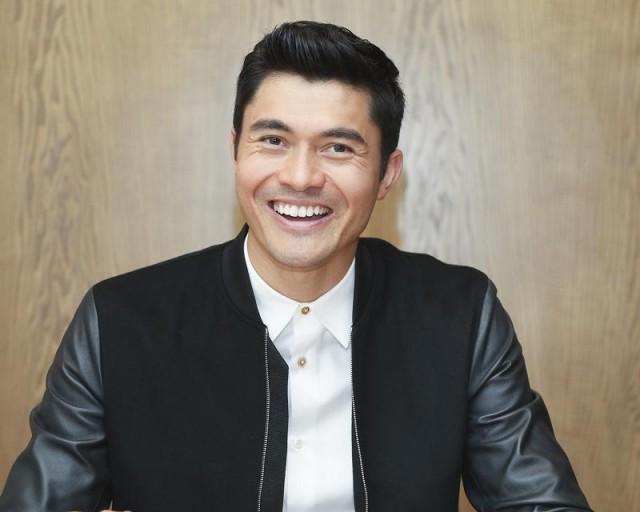
On his character being romantic at one time and mysterious on the other:
Both the characters have an air of old Hollywood, which is something funny enough, which Jon brought up. He is like Cary Grant in “Suspicion,” so you don’t know which side of the fence he lays on, but he has this air, this aura of him.
For (Director) Jon, he needed Nick to be John F. Kennedy Jr., a person of the world, but have this vast family and JFK Jr. used to ride around on his bike in New York to be a person of the city. So, for myself it was such a joy, because that is not only slightly similar to how I am, it’s the goal for a lot of what is going to dictate the rest of my career.
I want to bring back that old Hollywood charm in a very different spin, as an Asian leading man. I think you are correct in saying it’s the sweet spot. So, the interesting thing is finding projects that will complement these and hopefully continue something great.
RELATED: 'Crazy Rich' author Kevin Kwan calls Heart 'the darling of the Philippines'
On marrying an Italian-Taiwanese:
That’s right. She is an Italian-Taiwanese.
You know, that’s globalization, there’s no stopping it. It just goes to show that it doesn’t matter who you are or your background, you always find something in common, love is a universal prospect.
For my wife being, so she grew up in Tainan, just south of Taiwan, a big city, but in terms of Taiwan, quite a rural area. I grew up in Malaysia, the East Coast of Malaysia, and also in Surrey, just south of London. So, to have these sorts of intersects in life, is magnificent. It’s only going to get stronger and stronger. She definitely took the Italian trait of being very feisty and fiery. She doesn’t let me get away with much, so it’s really good.
On how his wife’s Italian family ended up in Taiwan:
To be honest, her real family is from Taiwan, but her biological father was Italian. So, she doesn’t have any contact with them. But through and through, she is pretty much Taiwanese.
On what his family expects from him:
To be honest, not much. I never knew I would be getting into, my wife found this very surprising. I was a journalist like yourself and I was a travel host for BBC and Discovery Channel for a long time, like seven to eight years. So for this role to come up with Jon, he really slapped some sense into me, for lack of a better expression, because I was so hesitant in auditioning. I was so hesitant to being an actor that he was like, you are right for this role and you can pull this off, believe in yourself and that was it, the switch was made, and this is all I think of now.
On cutting short his honeymoon:
Yeah. Many sacrifices were made, but not only my honeymoon. So Jon actually pulled me off. I was in South Africa for one day with one of my many honeymoons with my wife, and we were midway through the casting process and Jon was like, four days into being in Cape Town and having this beautiful time and it’s like, I have got to pull you, Warner Brothers really wants a screen test and this is the last thing I am ever going to ask you and I promise you this is going to be worth it.
Funnily enough, Jon got married last Friday and we had an amazing wedding in Napa, which I am so thankful for being there. He made me one of his groomsmen which made it even more special. We pulled him from his honeymoon to come on this tour. We went to Chicago, Seattle, San Francisco, and so we had a beautiful time together. So the wives, we still need to make amends with, but they understand, for a project like this, a lot of people gave up a lot. It was something special.
On becoming a journalist:
Luckily, I came from a very understanding family. Coming from parents who back in their day, being a mixed-race couple, wasn’t exactly the most welcoming of aspects. So, they fought through their struggles and they obviously didn’t listen to that and didn’t adhere to what was normal.
So they imprinted on us to be the person you want to be and as long as you are good to people and as long as you stay healthy, you don’t do harm onto others, we will be happy whatever you do.
My parents are actually coming to the premiere and thankfully Warner Brothers was kind enough to bring them out and give them the VIP treatment. They are going to be blown away, they are really excited about it.
On the transition from interviewing people to being interviewed:
That’s a good question. A little strange, but I guess I am used to it. I know how hard you work and how long it is to wait around. I try to give as much energy and try to make it fresh with everything. So, it wasn’t the hardest transition.
I love talking to people and I love sharing the stories, especially when you have a movie such as “Crazy Rich Asians” to push out and it means so much. I can honestly say that it’s just things that I am able to share, and it comes off so easily. I hope that you feel that. It’s been an interesting one not asking the questions but answering them, but it’s been fun. It really has been fun.
Jon M. Chu
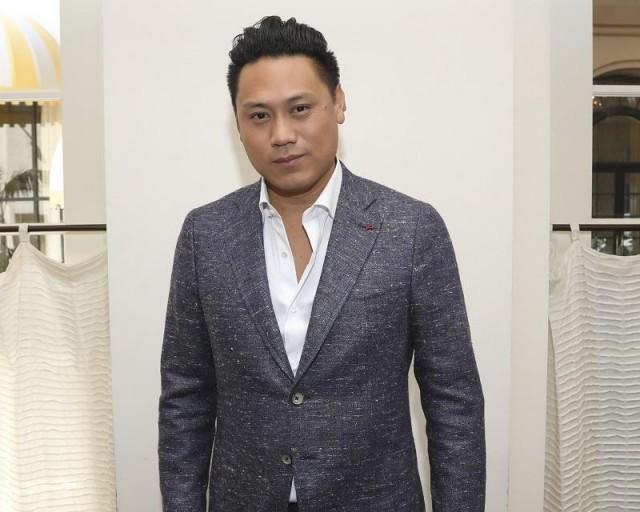
On the journey of making this film:
I wanted to make it really personal, even before I knew what movie it would become. I was looking for a movie that spoke to my dual cultural identity. I grew up in a Chinese restaurant. My mom and dad came over from China when they were 19, 20 years old. I’m an all-American kid; I played sports and did all these instruments. I always felt like I had to choose between one and the other.
I remember going to Asia for the first time. Everyone can relate, especially as you get older, going back to someplace that your family is from or where you have roots. This idea of, oh it feels different here. Then you realize, oh you don’t belong there either.
So, this story just happened to have a journey in this crazy world of Rachel Chu. The book spreads out the story among many different characters but what I really attached myself to was Rachel Chu, this Asian-American’s journey into Asia for the first time.
We really based all the stuff that we put into the screenplay about that journey in particular. That was really what got me hooked personally, so I added a lot of personal stuff — the dumpling scene, the mahjong scene — all that stuff isn’t in the book but comes from discussions and debates that I’ve had with my own family. What I realized, other people had had those exact same debates and we weren’t alone in our struggle that we felt so trapped in.
On Lisa Lu:
She is a warrior. I loved her in “Joy Luck Club” years ago. Our whole family went…the early Sunday morning to watch that movie together in a minivan and then went to dim sum and talked about it for hours. And Lisa was somebody we always talked about and loved.
We actually won an auction years later where she came to our restaurant and our whole family got to meet her. Odd coincidence but at the same time, she always stuck in my mind. So when this part came out, we needed someone both warm and fierce. She’s 92. She does a six or seven-hour theater show in Shanghai every year. She is an incredible woman and so to have her in this movie was an honor and to put her with Michelle Yeoh, with Constance, with that triad of women going head to head was just too irresistible not to have.
On the homage to the Asian culture:
I come from a very specific perspective. Because I was so engulfed in American culture, even though I grew up in a Chinese restaurant, I wasn’t visiting Taiwan or China every year. My instincts are much Americanized and my parents both harass me for it and support me for it. I rely on those instincts to communicate what I see in my family.
Obviously, I love my family. I see how they talk or the traditions we have in our family and when I tried to explain it to my friends that is something I’ve done my whole life so putting that in a movie saying, hey share this experience that I have lived with me is what I relied on. I remember growing up, it’s difficult to explore your own cultural identity because you’re scared and you’re not sure that people might think it’s weird.
I remember in grade school my parents came for Chinese New Year’s and they presented to the whole class what Chinese New Year’s was and I was so scared. I was in the back. I did not want this to happen. They brought lion dancers. They brought chocolates in gold wrapping. They brought red envelopes with a little money in it and then all of a sudden, I was the most popular kid in school. It was just about understanding what this was and not this weird thing. I tried to take that approach into this movie that it’s actually a great adventure to come with me to Singapore into this, they call it Singapore/Asia 101.
READ: Singapore for 9 types of day-trippers
You get to go in there…and again, Singapore isn’t China so it’s also very different. There’s so many different ethnicities there. Through Rachel, I hope to take the audience with me on a trip that you get to explore, that it’s not some alien land. It’s so warm. The food and the families and all the stuff is what you experience first when you get there and that’s how I see it too. — LA, GMA News




